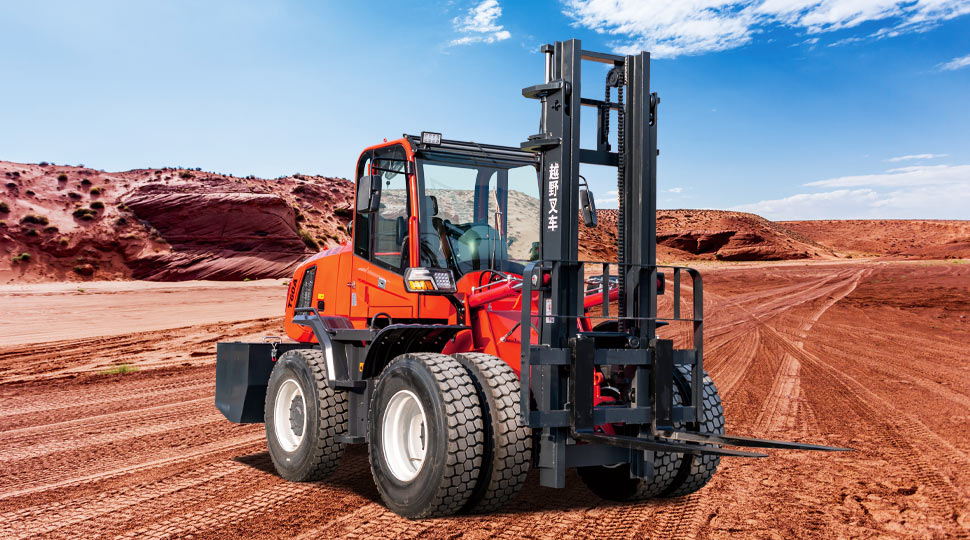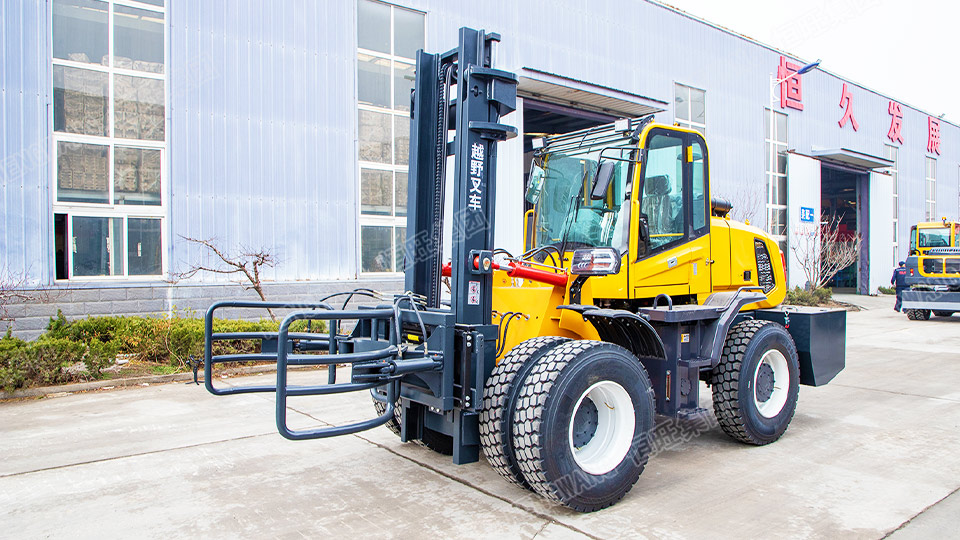In mud construction sites, "forklifts slipping as soon as they enter the site" and "sudden loss of power when climbing" are the most troublesome problems for operators — a single fault shutdown for 1 hour results in direct losses of over $200! These high-frequency faults seem complex, but 90% can be solved through simple self-inspection. This article sorts out a set of "5-minute quick troubleshooting methods" for the most common "slipping" and "power shortage" problems of Mud terrain forklift to help reduce downtime and improve work efficiency!
I. Slipping in mud? 3-step troubleshooting + solutions
Fault phenomenon: Wheels spin when driving in mud, unable to move forward/backward.
1.Check ground adhesion
lRoot cause: Mud is too deep (>30cm) or water content is too high (clay/swamp).
lSelf-inspection steps: Insert a stick into the mud pit; if resistance is <10cm, the mud layer is too soft and needs to change routes; if resistance is >20cm, ground adhesion is insufficient.
Solutions:
lReplace Mud terrain forklift-specific deep-groove tires (pattern ≥25mm) to increase grip;
lPave gravel/wooden boards (temporarily enhance adhesion).
2.Check tire pressure
lRoot cause: Too low tire pressure (<2.0bar) causes tire deformation and reduced grip.
lSelf-inspection steps: Measure with a tire pressure gauge; the standard tire pressure for Mud terrain forklift is 2.5bar (cold tire state).
lSolution: Inflate to 2.5bar (too high may cause tire explosion, too low may cause slipping).
3.Check pattern depth
lRoot cause: Worn tire patterns (<15mm) result in inability to "grab" mud.
lSelf-inspection steps: Insert a coin into the pattern; if the top of the coin is visible, the tire needs to be replaced immediately.
lSolution: Replace with Hengwang Mud terrain forklift original deep-groove tires (pattern depth 25mm, service life extended by 2 times).
II. Power shortage? 4-step troubleshooting + solutions
Fault phenomenon: Full throttle applied, but the forklift is weak when climbing/accelerating.

1.Check air filter
lRoot cause: Mud dust clogs the filter, resulting in insufficient air intake.
lSelf-inspection steps: Open the air filter box and check if the filter is covered with mud (normally clean or with only slight dust).
lSolution: Blow clean with compressed air in reverse (prohibit washing with water), clean once every 50 hours.
2.Check fuel quality
lRoot cause: Using low-quality diesel (containing impurities/water) clogs the fuel injector.
l Self-inspection steps: Take a small amount of fuel and let it stand; if there is stratification/turbidity, the fuel needs to be replaced.
l Solution: Refuel with diesel from regular gas stations (grade ≥0#), and install a fuel filter (Hengwang Mud terrain forklift is standard-equipped with dual-stage filtration).
3.Check for fuel line blockage
lRoot cause: Carbon deposits in fuel pipes/pumps cause poor fuel delivery.
lSelf-inspection steps: Listen to the pump sound after starting (normally a continuous "buzz"; intermittent sound indicates blockage).
lSolution: Soak the pump with fuel cleaning agent, or replace with Hengwang original fuel pipes (anti-aging, service life increased by 30%).
4.Check engine status
lRoot cause: Engine aging (insufficient cylinder pressure) results in reduced power output.
lSelf-inspection steps: Test with a cylinder pressure gauge (normal cylinder pressure ≥12bar; overhaul is needed if below 10bar).
lSolution: Regular maintenance (Hengwang Mud terrain forkliftt recommends changing engine oil + oil filter every 200 hours).
Conclusion
Mud faults are not terrible; what's terrible is "not knowing how to check or checking inaccurately"! Hengwang Mud terrain forklift is not only standard-equipped with anti-stuck tires and dual filtration systems but also helps reduce 90% of downtime through this Quick Troubleshooting Guide.

